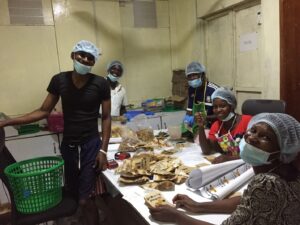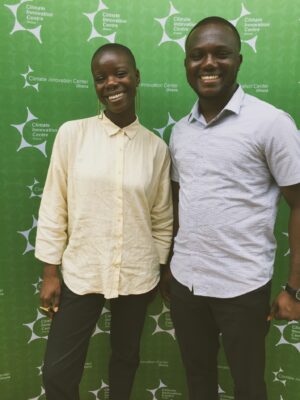It seems The Year of Return started early for some Ghanaians in the diaspora. As we all know, home is where the heart is and this week’s B&FT’s Inspiring Startups features a young lady who had it all living abroad but decided to leave them behind and start a business in her home country, Ghana. That decision has proven worthwhile as her business is making strides around the world. She shares with us what inspired her to make such a choice. Read!
Yvette Tetteh is a British-born Ghanaian raised in London and South Africa. She studied at the Stanford University in the United States where she got a degree in Anthropology and French. After her first degree, she decided not to pursue her second degree immediately but to work in a research farm in the states. For, her doing farming or anything related to agriculture is her calling, as sitting in the office is not her thing.
Her homecoming
After working with the company for some six months, she resigned and decided to come to her homeland, Ghana, to start her own farm as she felt there is enormous opportunity in agriculture that does not exist in the states. To, at least, study the agriculture terrain and understand farming better in Ghana, she first worked with a company that provides agri-business solutions to farmers in the Western Region. And after six months with them, she quit beginning her own expedition into the entrepreneurship world.
Initially, her main goal was to venture into farming. But that goal changed when she was introduced to Emmanuel Ampadu, another young man who graduated at Ashesi University and later became her business partner. Rather than go into mainstream farming, they decided to add value to some agriculture products and in the process, help address post-harvest losses. Their focus was to dehydrate fruits and turn them into snacks and place them in supermarkets and eventually export.
The business starts
After months of research on packaging and testing the idea with different kinds of fruits, they had a solution. They got a company in China that provides them with the packaging; and they settled on mango, papaw, and banana as their main raw materials. But before they put their idea into implementation, they registered the business with the name Pure and Just Co Ltd.

Currently, her products are available in about 50 retail locations in Ghana and the UK; and talks are far advanced to get them in Russia also.
Yvette feels, her products are unique for the reason that they are purely organic with no additives added. They can last up to a year on the shelves and still maintain their delicious taste; they are healthy as they are made from fresh fruits, and they are proudly 100 percent made in Ghana.
Vision
In the next few years, Yvette says, they will like to scale up and double sales and their out-grower farmers. They also want to impact on the community by supporting the farmers to expand their production.
Challenges
One major challenge that Yvette encountered is the delay in processes of acquiring certifications and permits. Whereas it takes a few hours to get businesses registered in some countries, it could take weeks or months to get it done in Ghana, and Yvette says it is a major problem for businesses.
Another practice that affects her business is the significant delay of payments from retail shops she supplies to. It affects the business’ cash flow and starves her the capital she requires to expand.
How GCIC has been of help
Yvette says the Ghana Climate Innovation Centre (GCIC), a World Bank-funded organization, has offered her team valuable help in the form of managerial training. Her company has been assigned a portfolio manager who has helped them in straightening things in the business. The organization has further awarded them a US$40,000 grant to purchase a modern dehydrator and a biogas digester system which helps them to save money on the use of energy.
The role of education
For Yvette, formal education has been of immense benefit to her. She says she is able to think critically and analyse issues to come up with the best strategy to handle a problem. Without education, she feels she would have managed the business poorly, that is if she would even be able to manage.
Why empowering women economically is important
Empowering women economically, Yvette says, is very important as it affords them the opportunity and right to determine their course of life. She feels, in African society, the only way women can be independent and exercise their human rights is to be economically empowered.
And on the national level, empowering women economically, she says, would lead to development as more than half the country’s population are women.
How the government should support startups
Since 2017 that Yvette has been an entrepreneur in Ghana, she feels one major reform the country needs is in the area of public service delivery, especially, with regards to processes in obtaining certificates and permits.

Again, she suggests government’s main focus should be creating a business-friendly environment for entrepreneurs such as easy filling of taxes, among others, and leaving initiatives such as business competitions and pitching for the private sector and other donor organisations to handle. For her, if the environment is very conducive, startups would find capital to inject into their business and manage it well.
Advice
“I would advise my fellow young entrepreneurs that as soon as possible, they should establish connections with people who can help them and find advisors who can advise them to make the right decisions.”
Contact: +233 20 011 9525










